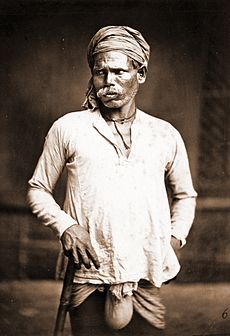
The Dom (Sanskrit: डोम, romanized: Doma, lit. 'a man of Dalit caste, living by singing and music'), also known as Domra, Domba, Domaka, Dombara and Dombari, are castes, or groups, scattered across India. Dom were a caste of drummer.[1] According to Tantra scriptures, the Dom were engaged in the occupations of singing and playing music.[2] Historically, they were considered an untouchable caste called the Dalits and their traditional occupation was the disposal and cremation of dead bodies.[3][4] They are in the list of Scheduled caste for Reservation in India in the Indian states of Uttar Pradesh, Bihar, Odisha, Andhra Pradesh, Jharkhand and West Bengal.[5][6][7][8][9][10]
- ^ Rama Sharma (1995). Bhangi, Scavenger in Indian Society: Marginality, Identity, and Politicization of the Community. M.D. Publications Pvt. Ltd. p. 126. ISBN 978-8185880709.
- ^ Cite error: The named reference
University of Illinois Presswas invoked but never defined (see the help page). - ^ Panchali Ray (2019). Politics of Precarity:Gendered Subjects and the Health Care Industry in Contemporary Kolkata. OUP India. p. 207. ISBN 978-0-19-909553-7.
- ^ Robert E. Van Voorst (2018). RELG: WORLD. Cengage Learning. p. 85. ISBN 9781337671866.
- ^ Cite error: The named reference
Registrar Generalwas invoked but never defined (see the help page). - ^ Cite error: The named reference
Biharonlineportalwas invoked but never defined (see the help page). - ^ Cite error: The named reference
West Bengalwas invoked but never defined (see the help page). - ^ Cite error: The named reference
scstrtiwas invoked but never defined (see the help page). - ^ "Legal Database". 11 August 2018.
- ^ "List of Scheduled Castes | Department of Social Justice and Empowerment - Government of India". socialjustice.gov.in. Retrieved 14 September 2023.